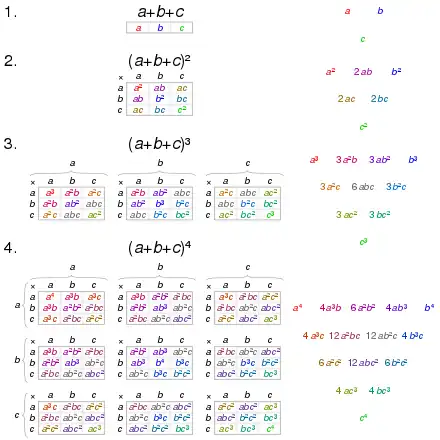
In mathematics, a trinomial expansion is the expansion of a power of a sum of three terms into monomials. The expansion is given by
where n is a nonnegative integer and the sum is taken over all combinations of nonnegative indices i, j, and k such that i + j + k = n.[1] The trinomial coefficients are given by
This formula is a special case of the multinomial formula for m = 3. The coefficients can be defined with a generalization of Pascal's triangle to three dimensions, called Pascal's pyramid or Pascal's tetrahedron.[2]
Derivation
The trinomial expansion can be calculated by applying the binomial expansion twice, setting , which leads to
Above, the resulting in the second line is evaluated by the second application of the binomial expansion, introducing another summation over the index .
The product of the two binomial coefficients is simplified by shortening ,
and comparing the index combinations here with the ones in the exponents, they can be relabelled to , which provides the expression given in the first paragraph.
Properties
The number of terms of an expanded trinomial is the triangular number
where n is the exponent to which the trinomial is raised.[3]
Example
An example of a trinomial expansion with is :
See also
References
- ↑ Koshy, Thomas (2004), Discrete Mathematics with Applications, Academic Press, p. 889, ISBN 9780080477343.
- ↑ Harris, John; Hirst, Jeffry L.; Mossinghoff, Michael (2009), Combinatorics and Graph Theory, Undergraduate Texts in Mathematics (2nd ed.), Springer, p. 146, ISBN 9780387797113.
- ↑ Rosenthal, E. R. (1961), "A Pascal pyramid for trinomial coefficients", The Mathematics Teacher, 54 (5): 336–338, doi:10.5951/MT.54.5.0336.